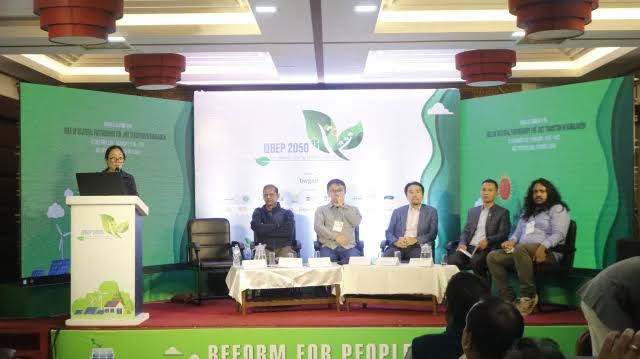Diplomatic Correspondent
Published:2024-12-14 01:00:19 BdST
Bangladesh power plan faces criticism over costs, climate impact
The Integrated Energy Power Master Plan (IEPMP) of Bangladesh has faced strong criticism for its economic impracticality, misalignment with global climate commitments, and potential setbacks to the country’s Net Zero targets.
The plan, supported by Japan’s Institute of Energy Economics (IEEJ) and the Japan International Cooperation Agency (JICA), has raised concerns about financial sustainability and its strain on Bangladesh’s foreign exchange reserves.
Speaking at the Bangladesh Energy Prosperity (BEP) 2050 conference, Yuki Tanabe, Programme Director at the Japan Centre for Sustainable Environment and Society (JACSES), accused the plan of prioritising Japanese corporate interests.
“It is a way for Japan to sell its surplus Liquefied Natural Gas to Asian countries, including Bangladesh,” he remarked during a session titled Role of Bilateral Partnerships for a Just Transition in Bangladesh.
Tanabe also highlighted the high costs associated with the IEPMP’s proposed ammonia and hydrogen co-firing for power generation, arguing that it is four times more expensive than renewable energy.
“This plan is not suitable for a developing country like Bangladesh,” he asserted, urging for a comprehensive revision of the plan and greater investments in renewable energy to facilitate Bangladesh’s transition to a greener future.
JICA’s Chief Representative in Bangladesh, Ichiguchi Tomohide, acknowledged the need for updates to the IEPMP.
“The power master plan should evolve with changing economic conditions. JICA remains committed to supporting Bangladesh’s renewable energy goals,” Tomohide said.
The session also emphasised the critical roles of Chinese and Nepalese investments in Bangladesh’s renewable energy sector. These partnerships were recognised as strategic in driving the country’s energy transition.
Research findings presented at the conference revealed that fossil fuel-based power generation in Bangladesh is unsustainable, economically nonviable, and environmentally damaging. In contrast, renewable energy was found to have a 97.8% success rate in Bangladesh and was identified as the most cost-effective option.
Discussions covered various thematic areas, including land constraints for renewable energy projects, the role of bilateral and multilateral cooperation in energy transition, and the contributions of Japan and G7 nations to Bangladesh’s progress.
The potential for South Asian energy cooperation and the historical responsibilities of international financial institutions like the Asian Development Bank (ADB) and the Asian Infrastructure Investment Bank (AIIB) were also highlighted.
A session on sustainable financing emphasized the need for stronger accountability, compliance, and safeguarding mechanisms in the financial sector.
Speakers called for revising Bangladesh’s taxonomy to align with global standards and urged banks to publish financial policies, project documents, and Environmental, Social, and Governance (ESG) reports.
The BEP 2050 conference, now in its second edition, has brought together over 300 participants, including policymakers, energy experts, development partners, private sector investors, civil society organizations, and youth.
This three-day event, co-organized by 23 national and international organizations, aims to promote a collaborative approach to renewable energy and sustainable development.
The conference will conclude with a declaration and pledge to governments and stakeholders, reinforcing commitments to renewable energy and a just energy transition.
Unauthorized use or reproduction of The Finance Today content for commercial purposes is strictly prohibited.


